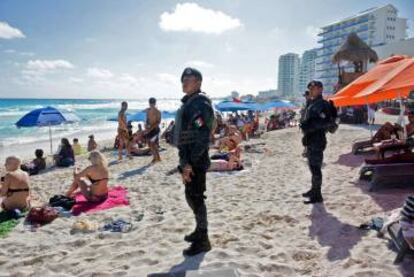Turf wars between Mexico’s drug cartels threaten tourism in Cancún
Business sector moves to play down two shootouts this week that left nine dead in Caribbean resort

Two shootouts in two days this week that left nine people dead and at least 15 people injured have shattered the calm of Cancún, threatening the beach resort’s position as the jewel in the crown of Mexico’s tourism industry.
On Monday, a man opened fire in the Blue Parrot nightclub in nearby Playa del Carmen, which was hosting the BPM electronic music festival. Five people died, among them a Canadian, a US national and an Italian, and 15 were wounded in the attack, footage of which was posted on social networks.
The following day, armed men attacked the State Attorney General’s office in Cancún, killing a policeman. Four of the attackers were gunned down and five others arrested.
Security analyst Alejandro Hope says that the incidents were a spillover from mounting tension between criminal gangs
Security analyst Alejandro Hope says that the incidents were a spillover from mounting tension between criminal gangs fighting for control of the drugs trade, extortion and other illegal activities in the area.
“Things have been getting worse for several months; last summer there were attacks on massage parlors and brothels, but this has made the news because the shootout took place at an international event and there were foreign victims, while the attack on the State Attorney’s office is a direct challenge to authority,” he says.
Cancún, in the state of Quintana Roo, on the Yucatan peninsula, depends on tourism, and business leaders have moved quickly to play down the violence. Fearful of following the fate of Acapulco, which has been gripped by violence between drug cartels since 2011, on Wednesday they announced a campaign using the slogan “Cancunners, because we love it,” to stop “bad news” and project a positive image of the resort.
Organizations representing hotels, restaurants and bars have sought to minimize the problem of extortion. “We have never had this issue in Cancún,” said Juan Pablo Aguirre, head of the local restaurant owners’ association, insisting that Tuesday’s violence was blown out of proportion. “The healthiest thing would be to stop talking about the topic,” he reiterated.
Luis Camara, the president of the Caribbean Business Coordination Council, said he knew of only one case of extortion.
“We don’t have that data because people are frightened of talking about that kind of thing,” he said.
The sector’s concern about the impact of a drugs war on the resort is understandable: in 2015, it contributed $8.6 billion to the public purse. Cancún is the destination of 35% of the money foreign tourists spend in Mexico.

Mexico’s drugs cartels have been active in Quintana Roo since the 1990s, when Mario Villanueva ran the state on behalf of the Institutional Revolutionary Party (PRI). Facing accusations of money laundering and close ties to Amado Carrillo, the leader of the Juárez cartel, Villanueva fled days before he was due to leave office in 1999. By then, the state had become a major transshipment point for drugs from Colombia to the United States. Villanueva is currently in jail.
Mexico’s drugs cartels are increasingly splitting off into local groups, fighting for control of key towns and cities. In Quintana Roo, the groups battling it out to run Cancún are splinter groups of the Zetas and the Gulf cartels, says Alejandro Hope. These gangs deal in drugs and run protection rackets. Hope says that attacks on massage parlors, bars and brothels have increased in recent years and that the incidents earlier this week in Cancún and Playa del Carmen were a warning that the violence is set to worsen.
You have young migrants with no economic future, and a buoyant market for criminals
Hope points to similar factors in Quintana Roo that could lead it down the same road as Acapulco: rapid population growth, growing income inequality and poverty, and a fast-growing regional economy that can feed extortion and other crime. “You have really marked segregation: the tourist area and the rest, you have young migrants with no economic future, and a buoyant market for criminals,” he says.
There are already signs that the rest of Mexico’s criminal organizations have set their sights on Cancún. Gustavo Nieto Navarro, who commands the 10th military region, told local media in September that an independent cartel had entered the north of the state. He also said that the Jalisco Nueva Generación cartel was trying to set itself up in Cancún. A US DEA report from mid-2015, warned that the Sinaloa cartel was also operating in the area.
English version by Nick Lyne.
Tu suscripción se está usando en otro dispositivo
¿Quieres añadir otro usuario a tu suscripción?
Si continúas leyendo en este dispositivo, no se podrá leer en el otro.
FlechaTu suscripción se está usando en otro dispositivo y solo puedes acceder a EL PAÍS desde un dispositivo a la vez.
Si quieres compartir tu cuenta, cambia tu suscripción a la modalidad Premium, así podrás añadir otro usuario. Cada uno accederá con su propia cuenta de email, lo que os permitirá personalizar vuestra experiencia en EL PAÍS.
¿Tienes una suscripción de empresa? Accede aquí para contratar más cuentas.
En el caso de no saber quién está usando tu cuenta, te recomendamos cambiar tu contraseña aquí.
Si decides continuar compartiendo tu cuenta, este mensaje se mostrará en tu dispositivo y en el de la otra persona que está usando tu cuenta de forma indefinida, afectando a tu experiencia de lectura. Puedes consultar aquí los términos y condiciones de la suscripción digital.








































